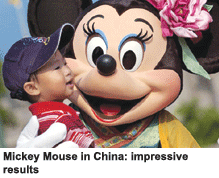On a Tuesday at 6 p.m in downtown shanghai, children begin arriving at a bland commercial building just as office workers are leaving. A small storefront leads to an English-language school run by Disney. Children as young as two toddle in and climb the stairs. At first glance, their classrooms look like dreary boxes, but two of the four walls are interactive video monitors. Each lesson is assisted by virtual mermaids, ducks, mice and other Disney icons. Touch the answer to a question (a fried egg, for example) on one screen, and it plops out of the sky on the other. While teachers instruct, the classroom seems to move.
 Most students seem happy and engaged. As they ask each other questions, their English sounds no less articulate than of similarly-aged Americans. Thousands of Chinese children have signed up for Disney’s schools since the first one was opened in October 2008.
Most students seem happy and engaged. As they ask each other questions, their English sounds no less articulate than of similarly-aged Americans. Thousands of Chinese children have signed up for Disney’s schools since the first one was opened in October 2008.
Tuition is $1,800 (Rs.82,800) a year: a big sum in China. But Disney claims that its results are impressive. It has ten schools in Shanghai, five in Beijing and plans to double that number in the next year, slowly extending from China’s two largest cities to surrounding areas. The main constraint is not customers — the older schools already have waiting lists — but training and staff. New schools must therefore be in places where they can easily be supervised.
Each classroom has a local and a Western instructor. Images have been Sinified: rice, for example, comes in a bowl, not heaped on a plate. More than 300 songs, all tied to animations, provide mnemonic help. Some 60 books augment the course materials. Everything has been checked with China’s wary censors.
The initial development costs, which Disney has not disclosed, must have been huge. Within a decade the programme will have a material impact on Disney’s results, predicts Andrew Sugerman, who runs it. Disney hopes to keep doubling the number of Chinese students it teaches every year for a while. This is a risky venture — long-term, complex and in an area China considers sensitive: education. Yet the potential rewards are huge.
Disney’s focus groups find that for Chinese parents, “education means everything”. English, in particular, is viewed as a ticket to the wider world, says Sugerman. Studies commissioned by Disney estimate that the market for children’s English-language education in China is growing by 12 percent annually and will reach $3.7 billion (Rs.17,020 crore) by 2012. That may be too modest. Adele Mao, an analyst at OLP Global, a research and consulting firm, reckons the market is already nearly $6 billion a year and is growing by 20 percent.
(Excerpted and adapted from The Economist)